Decoupling from China
Amit Bhandari, Fellow, Energy & Environment, Gateway House was in conversation with Blaise Fernandes, Director, Gateway House. This discussion was moderated by Manjeet Kripalani, Executive Director, Gateway House.
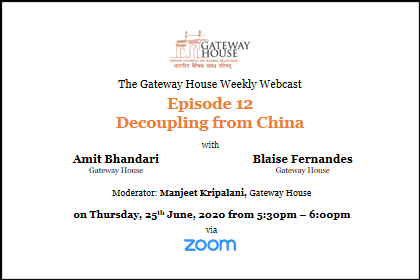 Courtesy: Gateway House
Courtesy: Gateway House
Amit Bhandari, Fellow, Energy & Environment, Gateway House was in conversation with Blaise Fernandes, Director, Gateway House. This discussion was moderated by Manjeet Kripalani, Executive Director, Gateway House.
 Courtesy: Gateway House
Courtesy: Gateway House
Ambika Khanna, Senior Researcher, International Law Studies Programme, Gateway House, in discussion with Bharat Bhise, CEO and Founder, Bravia Capital; Greg Falkof, Partner, Eversheds Sutherland; Rutvik Patel, Head - Legal & Corporate Affairs, TBEA Energy (India) Pvt. Ltd. on invoking Force Majeure amidst COVID-19.
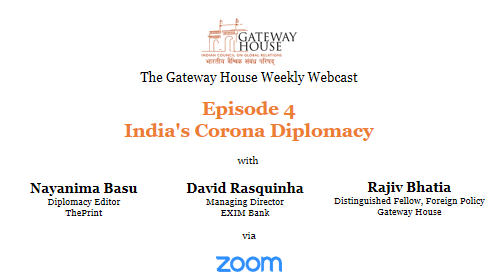 Courtesy: Gateway House
Courtesy: Gateway House
In this webcast, we discuss India's Diplomacy during the COVID-19 pandemic with David Rasquinha, Managing Director, Exim Bank, Amb. Rajiv Bhatia, Distinguished Fellow, Foreign Policy Studies Programme, Gateway House and Nayanima Basu, ThePrint.
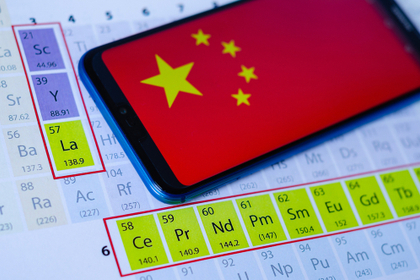 Courtesy: Shutterstock
Courtesy: Shutterstock
The second-most important issue on everyone's mind after the Coronavirus, is Rare Earths - those metallic elements like scandium and cerium, used in every aspect of modern electronics like our cell phones, rechargeable batteries, florescent lighting. The reason is: China. China has the world's largest deposits and production of rare earths, and has not hesitated to withhold its export to countries that disagree with it in the past.
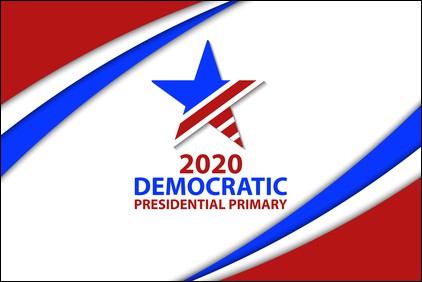 Courtesy: Shutterstock
Courtesy: Shutterstock
As part of our weekly series of podcasts in the run-up to the U.S. elections, in this episode on the first month of the Democratic Party’s primaries, Ambassador Neelam Deo, Director and Co-founder of Gateway House, on Biden’s candidature, how the U.S. appears still unready for a woman president and why the Indian American community, which has traditionally voted Democrat, may be ambivalent this time
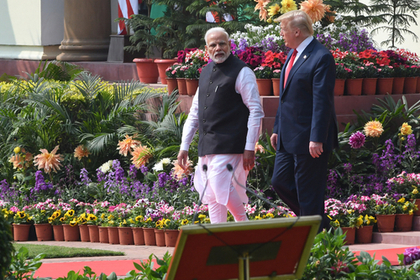 Courtesy: Shutterstock
Courtesy: Shutterstock
President Trump enjoyed every moment of the hype that attended his February 2020 visit to India, says Ambassador Neelam Deo, Director and Co-founder of Gateway House, in this podcast, even as the focus was on concrete outcomes, such as defence purchases and oil procurement deals. She discusses the geopolitical implications of a closer India-U.S. strategic relationship and the weaknesses of the U.S.-Taliban peace deal
The German-French collaboration has been the motor of the European Union so far, but there has been a rise of resentment within the other European countries, with a mobilisation of right-wing parties and talk of an Italian-Polish motor instead, says Neelam Deo, Director and Co-Founder of Gateway House, in this interview. Elections to the European Parliament are taking place from May 23-26
Academic and columnist M.D. Nalapat, in this interview with Manjeet Kripalani, speaks of how a tardy bureaucracy has brought about “a too-cautious” policy towards the U.S. and China as opposed to the former Gujarat chief minister’s greater openness in consulting people before handing over policy implementation to the bureaucracy. He also discusses the prime minister’s shrewd approach to South Asia, the dependable warmth of the Japanese and a range of other topics
The 44th G7 summit, held in Canada in the first week of June, ended on a tense, disunited note—not unlike the premise of Richard Haass’ 2017 book, The World in Disarray: American Foreign Policy and the Crisis of the Old Order. In this interview, the President of the Council on Foreign Relations discusses the role of international institutions, World Order 2.0 and how India can participate in it
Marina Kaljurand, Chair, Global Commission on Stability of Cyberspace, Brussels, Belgium, said governments had to collaborate closely with lawyers, and the private sector, which is leading some major developments